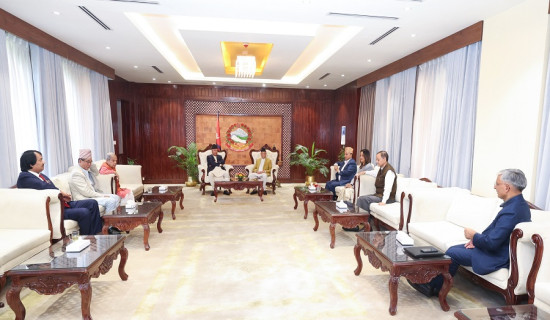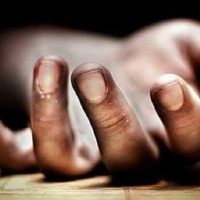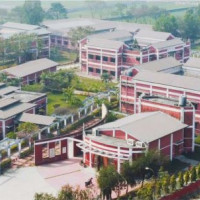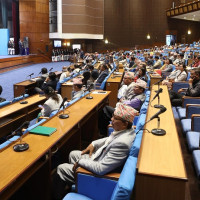- Tuesday, 24 June 2025
COVID-19 risk not high, but caution needed: Experts
By Arpana Adhikari,Kathmandu, jun,1: With a surge in COVID-19 cases, including seven deaths, in India, concerns are growing in Nepal over the potential resurgence of the virus.
According to IndiaToday, India has reported over 2,700 active COVID-19 cases, with seven deaths.
Health experts in Nepal have warned that the spike in cases across the border could also impact Nepal and called for increased surveillance and preparedness. They have urged the public to remain cautious and adhere to health safety protocols.
Indian health authorities have identified four new COVID-19 variants, LF.7, XFG, JN.1 and NB.1.8.1. Among them, JN/1 is currently the most commonly detected variant in India, followed by BA.2, which accounts for 26 per cent of cases and other Omicron subvariants 20 per cent.
The World Health Organisation (WHO) has classified these variants as ‘under monitoring’, rather than ‘variants of concern.”
JN.1 is a subvariant of Omicron’s BA.2.86. First identified in August 2023, it was declared a ‘variant of interest’ by WHO in December 2023. It carries around 30 mutations that weaken the immune system.
“Although JN.1 spreads more rapidly than previous variants, it is not considered less pathogenic than delta variant,” said Dr. Sher Bahadur Pun, Chief of the Clinical Research Unit at Sukraraj Tropical and Infectious Disease Hospital.
He said the variant has already become the most dominant in many countries worldwide, including Nepal.
Likewise, NB.1.8.1 is notable for its multiple spike protein mutations, which allow it to spread faster than other variants.
“With the variant spreading fast in India and considering our experiences, we must remain alert,” he said. He explained that the JN.1 variant is not new to Nepal and most people may have developed some level of immunity against it.
However, he warned that the variant still has the potential to mutate and its future severity remains uncertain.
No surge in patients, vaccination demands increasing
Dr. Pun said that there has been no recent increase in patients visiting the hospital with COVID-19-like symptoms. However, public interest in COVID-19 vaccination has grown following reports of rising cases in India.
“Since the day before yesterday, I’ve been receiving numerous phone calls and visits from people seeking information about the COVID vaccine,” Dr. Pun said.
Shyam Singh Bohora, an Auxiliary Health Worker (AHW) at the emergency ward of Sukraraj Tropical and Infectious Disease Hospital, confirmed a rise in the number of people visiting the ward for vaccination.
Dr. Pun urged the government to consider introducing a targeted vaccination strategy for people with compromised immunity.
Teku Hospital continues to provide COVID vaccinations. Many individuals traveling abroad, particularly for education, are also opting for the vaccine, especially when their destination countries require it.
No new COVID-19 cases reported
Santosh Subedee, Deputy Chief Med. Technologist at National Public Health Laboratory, Teku, said there is no indication of a surge in COVID-19 cases in Nepal.
Although testing continues as it has since the onset of the pandemic, the number of positive cases remains low, with only three or four people visiting the lab daily for PCR testing.
“The last COVID-19 positive case was reported between October and November 2024, so there is currently no indication of a rise in either positive cases or testing rates,” he said.
He further informed, “Unless the number of cases exceeds 40, we don’t conduct genome sequencing to detect the specific variant.”
Health screening intensified
Director at EDCD, Dr. Chandra Bhal Jha, said the division has been constantly consulting with World Health Organisation and public health experts to assess preparedness and implement appropriate steps.
According to him, health desks stationed at Tribhuvan International Airport and border entry points have been directed to remain alert and act promptly if COVID-19 like symptoms are reported.
The division has already distributed Rapid Diagnostic Test (RDT) kits to border areas of all seven provinces to facilitate immediate testing of suspected cases.
Health workers at these points have been instructed to conduct health screening for travelers entering Nepal from India, he said.
Dr. Jha clarified that the six COVID-19 cases reportedly confirmed in Dulikhel were actually only suspected cases. He explained that the swabs had been tested using rapid test kits, which are not fully reliable and can produce positive results even in individuals with flu-like symptoms. “All of them have already recovered and returned home,” he added.
Situation under control, vigilance required
Dr. Jha said since the EDCD has been coordinating with the WHO and health experts, the current situation is not considered risky but caution is still necessary.
He asked people to remain alert and follow safety measures, such as washing hands regularly and wearing masks while going outside.
















